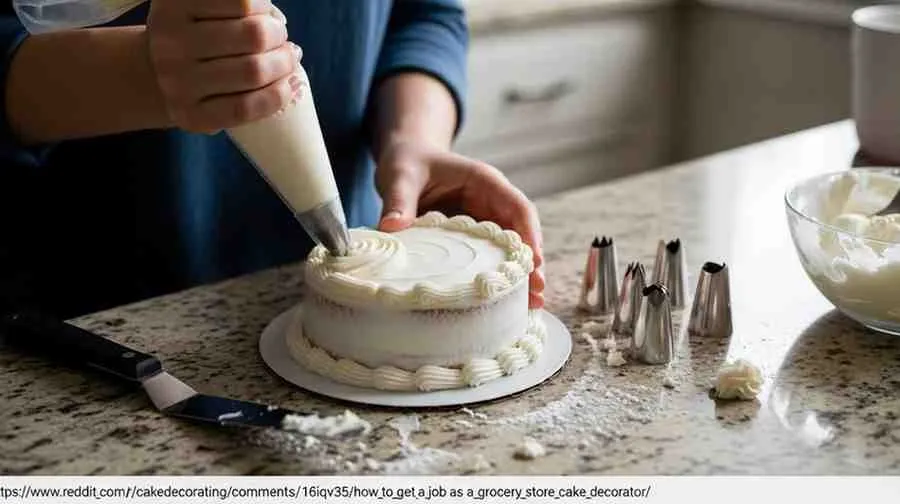How to Become a Cake Decorator: Your Complete Guide to Starting a Sweet Career
Meta Description: Discover how to become a cake decorator with our comprehensive guide covering skills, training, certifications, job opportunities, and career paths in bakery decoration.
Introduction: Transform Your Passion for Baking Into a Rewarding Career
Have you ever admired the intricate designs on a wedding cake or the cheerful characters decorating a birthday cake and wondered how those edible masterpieces came to life? If you love working with your hands, have an eye for detail, and dream of creating beautiful confections that bring joy to celebrations, a career as a cake decorator might be your perfect calling.
Cake decorating is more than just a job—it’s an art form that combines creativity, technical skill, and the satisfaction of making special occasions even more memorable. Whether you envision yourself crafting elegant wedding cakes in a custom bakery, creating playful designs at a grocery store bakery, or building your own cake business from home, the path to becoming a professional cake decorator is more accessible than you might think.
The baking industry continues to thrive, with steady demand for skilled cake decorators across various settings. From small-town grocery stores to high-end wedding cake boutiques, opportunities abound for talented decorators who can bring visions to life in buttercream and fondant.
This comprehensive guide will walk you through everything you need to know about how to become a cake decorator, including the essential skills you’ll need, training and education options, different career paths available, realistic salary expectations, and practical steps for landing your first decorating job—even if you have no professional experience.
By the end of this article, you’ll have a clear roadmap for launching your cake decorating career and understanding what it truly takes to succeed in this creative and fulfilling profession.
Understanding the Cake Decorating Profession
Before diving into the specifics of training and job hunting, let’s explore what cake decorators actually do and the various environments where they work.
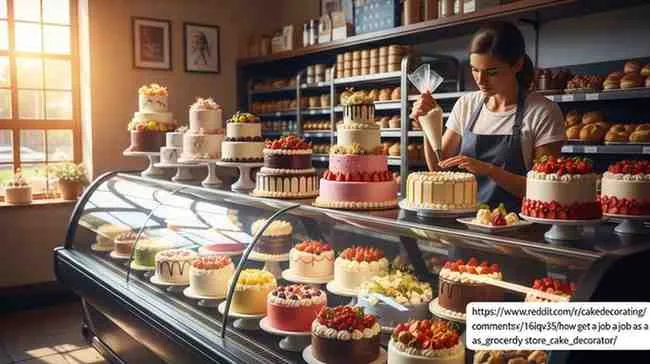
What Does a Cake Decorator Do?
Cake decorators are skilled artisans who transform plain baked goods into visually stunning creations. Your daily responsibilities as a cake decorator typically include:
- Consulting with customers to understand their design preferences, theme requirements, and budget constraints
- Creating custom cake designs based on customer requests or seasonal themes
- Applying various frosting techniques including buttercream piping, fondant work, and royal icing details
- Using specialized tools like pastry bags, tips, spatulas, and modeling tools to create decorative elements
- Mixing and coloring frosting to achieve desired shades and consistencies
- Creating decorative elements such as sugar flowers, chocolate sculptures, and edible prints
- Maintaining cleanliness and food safety standards in the decorating area
- Managing inventory of decorating supplies and ingredients
- Pricing custom cake orders based on complexity and materials
- Meeting production deadlines, especially during busy seasons and holidays
The role requires both artistic creativity and technical precision. You’ll need steady hands for detailed piping work, color theory knowledge for creating appealing combinations, and spatial reasoning to visualize three-dimensional designs.
Types of Cake Decorating Careers
The cake decorating field offers several distinct career paths, each with unique characteristics:
Grocery Store Cake Decorator
Working as a grocery store cake decorator is one of the most common entry points into the profession. In this role, you’ll typically work in the bakery department of supermarket chains creating both pre-made display cakes and custom orders for customers. This environment offers:
- Regular hours with less weekend and evening work than custom bakeries
- Steady employment with benefits like health insurance and paid time off
- Exposure to high volume production teaching efficiency
- Structured training programs for new decorators
- Opportunities to work with a team of bakery professionals
Grocery store positions are excellent for beginners because they provide structured learning environments and consistent practice with fundamental techniques.
Custom Bakery Decorator
Custom bakeries specializing in wedding cakes, special occasion cakes, and artistic designs require decorators with more advanced skills and creativity. These positions typically involve:
- Creating highly customized, one-of-a-kind designs
- Working directly with clients through consultations
- Using premium ingredients and advanced techniques
- More irregular hours including weekends for wedding deliveries
- Higher creative expectations and artistic freedom
Wholesale Bakery Decorator
Large-scale wholesale bakeries supply cakes to restaurants, cafeterias, and retail locations. Decorators in these facilities focus on:
- High-volume production of standardized designs
- Efficiency and speed while maintaining quality
- Assembly-line style work with specialized tasks
- Consistent schedules and production quotas
- Less customer interaction and more focus on execution
Home-Based Cake Decorator
Many decorators eventually launch their own home-based businesses, offering custom cakes from cottage food operations or licensed home kitchens. This path provides:
- Maximum creative control and flexibility
- Direct client relationships and pricing control
- Ability to specialize in specific styles or occasions
- Requires entrepreneurial skills beyond decorating
- More unpredictable income and self-managed benefits
Hotel and Restaurant Pastry Decorator
Upscale hotels and restaurants employ cake decorators as part of their pastry teams, creating desserts for guests and special events. These positions offer:
- Exposure to fine dining standards and plating aesthetics
- Collaboration with experienced p
- Broader dessert preparation beyond just cakes
- Premium ingredients and sophisticated techniques
- Typically requires culinary training or extensive experience
Essential Cake Decorator Skills You Need to Develop
Success as a cake decorator requires a unique combination of artistic abilities, technical skills, and professional qualities.
Technical Skills
Piping Techniques: Mastering various piping methods is fundamental to cake decorating. You’ll need proficiency in:
- Creating borders, shells, rosettes, and scrollwork
- Writing legible messages in various styles
- Piping flowers like roses, carnations, and drop flowers
- Using different tip types (round, star, petal, leaf) effectively
- Controlling pressure and hand positioning for consistent results
Frosting Application: Beyond piping, you’ll need expertise in:
- Crumb coating cakes for smooth foundations
- Creating perfectly smooth buttercream finishes
- Applying textured effects like ruffles, basket weave, and combing
- Working with different frosting types (buttercream, ganache, whipped cream)
- Achieving sharp edges and clean lines
Fondant Work: Many decorators specialize in fondant, which requires:
- Rolling fondant to even thickness without tearing
- Covering cakes smoothly without air bubbles or wrinkles
- Creating fondant decorations and figures
- Using molds, cutters, and shaping tools
- Understanding humidity and temperature effects on fondant
Color Theory: Creating appealing color combinations requires understanding:
- Color mixing to achieve custom shades
- Complementary and analogous color schemes
- How colors appear on different frosting types
- Seasonal and thematic color palettes
- Consistency in color matching for multi-tier cakes
Artistic Skills
Design Sense: Successful decorators possess strong visual skills including:
- Proportion and balance in cake composition
- Understanding of visual weight and symmetry
- Ability to scale designs for different cake sizes
- Translating inspiration images into achievable designs
- Creating original designs that reflect current trends
Attention to Detail: Professional cake decorating demands meticulous precision with:
- Consistent piping pressure and spacing
- Uniform flower petals and decorative elements
- Straight lines and even borders
- Clean finishing touches that hide imperfections
- Quality control ensuring every cake meets standards
Creative Problem-Solving: You’ll regularly encounter challenges requiring innovative solutions:
- Adapting designs when requested elements aren’t feasible
- Repairing mistakes or structural issues
- Working within budget constraints creatively
- Adjusting plans when supplies run short
- Creating custom solutions for unusual requests
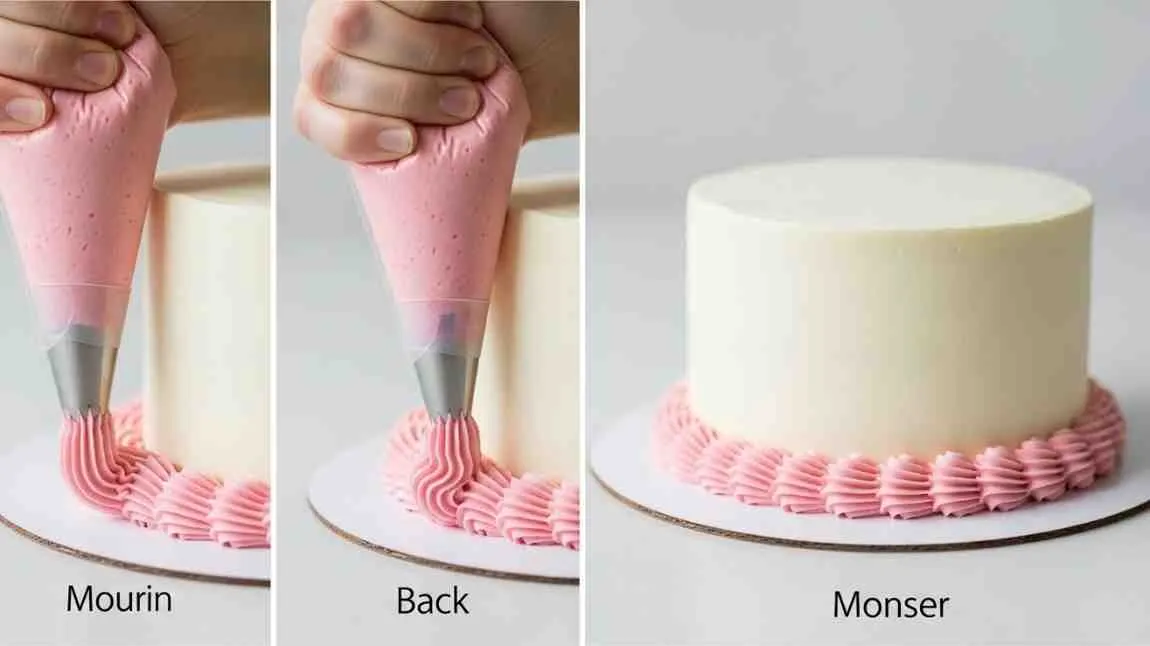
Professional Skills
Time Management: Meeting deadlines is crucial in cake decorating, requiring:
- Accurate estimation of how long designs will take
- Efficient workflow that maximizes productivity
- Ability to prioritize multiple orders with different deadlines
- Managing time during peak seasons and holidays
- Balancing quality with necessary speed
Customer Service: Especially in retail bakery environments, you’ll need:
- Clear communication about what’s possible within timelines and budgets
- Patient listening to understand often vague customer visions
- Diplomatic handling of complaints or dissatisfaction
- Professional demeanor even during stressful busy periods
- Building rapport that encourages repeat business
Physical Stamina: Cake decorating is more physically demanding than many realize:
- Standing for long periods while decorating
- Fine motor control during detailed work
- Lifting heavy cake layers and equipment
- Working in cold environments (near refrigeration)
- Repetitive hand movements that can strain muscles
Food Safety Knowledge
Professional cake decorators must understand and practice proper food safety including:
- Proper handwashing and personal hygiene
- Correct food storage temperatures and timelines
- Cross-contamination prevention
- Allergen awareness and ingredient disclosure
- Equipment sanitization procedures
- Local health department regulations
How to Get Training: Education and Certification Options
One of the most common questions aspiring decorators ask is whether formal training is necessary. The answer depends on your goals and the specific positions you’re pursuing.
Formal Education Paths
Culinary School Pastry Programs
Comprehensive pastry arts programs offered by culinary schools provide the most thorough training. These programs typically include:
- 6 months to 2 years of study depending on degree type (certificate, associate’s)
- Hands-on training in all aspects of baking and pastry
- Coursework in cake decorating, sugar work, chocolate, bread, and plated desserts
- Food safety certification
- Business management and costing
- Externship opportunities at professional bakeries
Reputable culinary schools include institutions like the Culinary Institute of America, Johnson & Wales University, and Auguste Escoffier School of Culinary Arts. Tuition ranges from 15,000 to 40,000 dollars depending on program length and institution.
Advantages: Comprehensive skill development, industry connections, credibility with employers, structured learning environment
Disadvantages: Significant financial investment, time commitment, covers many topics beyond cake decorating
Community College Baking Programs
Many community colleges offer more affordable baking and pastry certificates with cake decorating components. These programs provide:
- 6 months to 1 year of study
- Lower tuition costs (typically 3,000 to 10,000 dollars)
- Evening and weekend class options for working students
- Practical, job-focused curriculum
- Local industry connections
Advantages: Affordability, flexibility, community-focused placement assistance
Disadvantages: May be less comprehensive than private culinary schools, limited availability in some areas
Alternative Training Options
Cake Decorating Training Through Specialty Schools
Schools dedicated specifically to cake decorating and sugar arts offer focused programs including:
- Wilton Method courses teaching their specific decorating system
- International sugar art schools offering masterclasses
- Short-term intensive workshops (days to weeks)
- Online and in-person format options
- Specialized focus on decorating rather than broader baking
These programs are ideal for those interested exclusively in decorating rather than comprehensive pastry arts.
On-the-Job Training
Many cake decorators learn through workplace training programs, particularly common at grocery stores and commercial bakeries. This approach involves:
- Starting in entry-level bakery positions
- Learning from experienced decorators through mentorship
- Gradual skill building from simple to complex techniques
- Paid learning rather than paying for classes
- Real-world experience from day one
Major grocery chains like Walmart, Kroger, and Publix often hire entry-level cake decorators with minimal experience and provide comprehensive training programs.
Online Courses and Tutorials
The internet has made cake decorating education more accessible through:
- Platforms like Skillshare, Udemy, and Creativebug offering affordable courses
- YouTube tutorials from professional decorators
- Virtual classes from established decorating schools
- Self-paced learning fitting any schedule
- Ability to replay and practice techniques repeatedly
Advantages: Affordability, flexibility, ability to learn specific techniques as needed
Disadvantages: No hands-on instructor feedback, requires self-discipline, no credential recognized by employers
Books and Practice
Self-taught decorators often combine instruction books with extensive practice:
- Classic texts like Wilton’s cake decorating books
- Technique-specific guides for fondant, royal icing, or buttercream
- Practicing on dummy cakes or donated baked goods
- Building portfolio through friends’ and family celebrations
- Learning through trial and error
This approach works best for those with natural artistic ability and strong self-motivation.
Certifications and Credentials
While not always required, professional certifications can enhance your credibility and employment prospects:
Certified Decorator (CD): Offered by the Retail Bakers of America, this certification demonstrates competency in fundamental decorating skills.
Certified Master Decorator (CMD): An advanced credential from RBA requiring extensive experience and passing rigorous practical examinations.
Food Handler’s Certificate: Required in most jurisdictions for anyone working with food professionally. Usually obtained through local health departments or online courses.
ServSafe Food Handler: A widely recognized food safety certification demonstrating knowledge of proper food handling practices.
Wilton Method Certification: For those completing Wilton’s comprehensive course series, this credential is recognized in the decorating community.
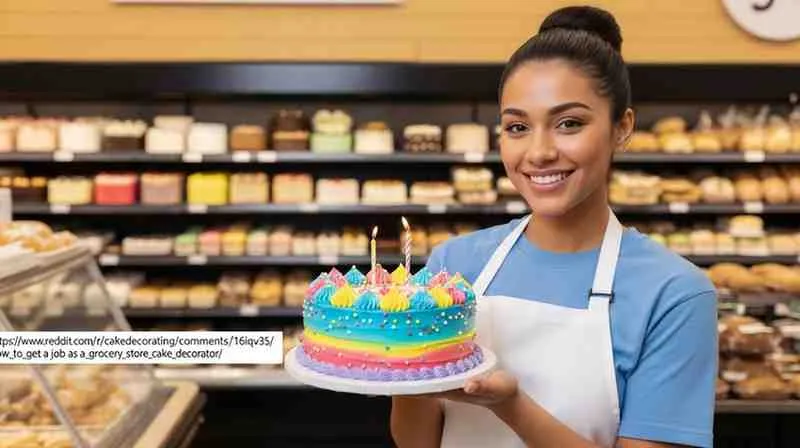
Steps to Become a Professional Cake Decorator
Now that you understand the skills and training required, let’s outline the practical steps for launching your cake decorating career.
Step 1: Assess Your Starting Point and Set Goals
Begin by honestly evaluating your current skills and defining clear career objectives:
- What’s your current baking and decorating experience level?
- Do you prefer employment with a company or eventual self-employment?
- What type of decorating work excites you most (wedding cakes, character cakes, elegant designs)?
- What’s your financial situation and ability to invest in training?
- What’s your timeline for career transition?
Understanding where you are and where you want to go helps you choose the most appropriate path forward.
Step 2: Develop Fundamental Skills
Before seeking employment or clients, build a foundation of essential techniques:
Practice Basic Piping: Master fundamental borders, writing, and simple flowers. Practice daily using shortening-based practice frosting that can be reused, reducing costs while building muscle memory.
Perfect Your Crumb Coat and Smoothing: These fundamental techniques underpin nearly all decorated cakes. Practice achieving smooth, level surfaces consistently.
Experiment with Color: Work on mixing custom colors and understanding how colors interact. Create a color mixing reference chart for future use.
Study Design Principles: Analyze professional cakes in person and online, noting what makes designs successful. Practice sketching cake designs before executing them.
Build a Practice Portfolio: Document your practice work with good photography. Even practice cakes can demonstrate developing skills to potential employers.
Step 3: Gain Formal or Informal Training
Based on your goals and resources, pursue appropriate training:
If seeking employment at established bakeries, formal training through culinary school or community college programs provides credibility and comprehensive skill development. The investment often pays off through better starting positions and higher initial wages.
If planning to be self-employed or seeking entry-level grocery store positions, combination approaches work well—take some specialty courses in areas where you need improvement, supplement with online learning, and gain experience through practice.
For those with existing home baking experience wondering “Can I start cake decorating with home baking experience?”, the answer is yes, but expect a learning curve. Home baking provides useful foundation, but professional decorating requires speed, consistency, and mastery of techniques you may not have encountered in home kitchens.
Step 4: Get Your First Cake Decorator Job
How to Get a Cake Decorator Job with No Experience
Breaking into the field without experience feels challenging, but several strategies work effectively:
Start with Entry-Level Positions: Many grocery store bakeries hire entry-level cake decorators with little to no experience, providing training programs teaching their specific methods and standards. Look for “bakery clerk” or “bakery assistant” positions that offer pathway to decorating roles.
Create a Portfolio: Even without professional experience, a portfolio showing practice cakes, decorated cupcakes, and cookies demonstrates your abilities. Include variety showing different techniques and styles.
Emphasize Transferable Skills: If you have customer service experience, artistic background, or related food industry work, highlight these transferable abilities on your resume.
Express Willingness to Learn: Demonstrate enthusiasm, teachability, and strong work ethic during interviews. Many employers prioritize these qualities over extensive experience.
Consider Seasonal and Part-Time Opportunities: Bakeries often need additional help during peak seasons (holidays, wedding season). These temporary positions can lead to permanent roles.
Network in the Baking Community: Attend local cake decorating guild meetings, take classes at craft stores, and connect with professional decorators on social media. Relationships often lead to opportunities.
Step 5: Continue Learning and Advancing
Professional cake decorating requires ongoing skill development:
- Take advanced classes in specialized techniques (sugar flowers, chocolate work, airbrush)
- Study current trends through social media and industry publications
- Attend cake shows and competitions
- Practice new techniques regularly
- Seek mentorship from more experienced decorators
- Consider competition participation to push your skills
The most successful decorators maintain curiosity and commitment to continuous improvement throughout their careers.
Career Paths and Advancement Opportunities
Understanding potential career progression helps you plan for long-term growth in cake decorating.
Entry-Level Positions
Most decorators begin with positions like:
- Bakery Decorator Assistant: Supporting lead decorators, preparing frosting, basic decorating tasks
- Grocery Store Cake Decorator: Creating standard and custom cakes for retail customers
- Production Decorator: High-volume decorating of standardized designs in wholesale facilities
Starting salaries for entry-level positions typically range from 11 to 15 dollars per hour depending on location and employer.
Mid-Level Positions
With experience and advanced skills, decorators progress to:
- Lead Cake Decorator: Supervising other decorators, handling complex custom orders
- Bakery Specialist: Taking customer orders, consulting on designs, managing decoration schedules
- Custom Cake Designer: Creating premium custom cakes for weddings and special events
Mid-level decorators typically earn 15 to 22 dollars per hour or 32,000 to 45,000 dollars annually in salaried positions.
Advanced Career Options
Experienced decorators can advance to:
- Head Decorator/Decorating Manager: Overseeing entire decorating departments, training staff, managing budgets
- Pastry Chef: Broader role including all pastry and dessert production beyond cakes
- Bakery Manager: Overall bakery operations management including production, staffing, and financials
- Cake Business Owner: Operating custom cake businesses independently
- Decorating Instructor: Teaching classes at schools, craft stores, or privately
Advanced positions can pay 45,000 to 70,000 dollars or more annually, with custom cake business owners’ earnings varying widely based on business success.
Specialization Opportunities
Many decorators develop specialized niches including:
- Wedding Cake Specialist: Focusing exclusively on high-end wedding cakes
- Sculpted and Novelty Cakes: Creating three-dimensional sculptural cakes
- Sugar Flower Artist: Specializing in realistic sugar flowers
- Competition Decorator: Participating in and winning decorating competitions
- Cake Decorating Demonstrator: Representing brands at trade shows and events
Real-Life Success Stories: Cake Decorators Who Made It
Maria’s Journey from Home Baker to Professional Decorator
Maria had been baking cakes for family celebrations for years when she decided to pursue decorating professionally at age 35. Without funds for culinary school, she enrolled in Wilton classes at her local craft store while working full-time in retail. After completing the four-course series, she applied to every bakery within 30 miles. A small grocery store hired her as an entry-level decorator, providing additional training.
Maria worked part-time in the bakery for 18 months while maintaining her retail job, building speed and consistency. When a full-time position opened, she transitioned completely to decorating. Three years later, she’s now the lead decorator, training new staff and handling the most complex custom orders. Her advice: “Don’t underestimate grocery store positions. I learned so much and got paid while learning instead of paying for school.”
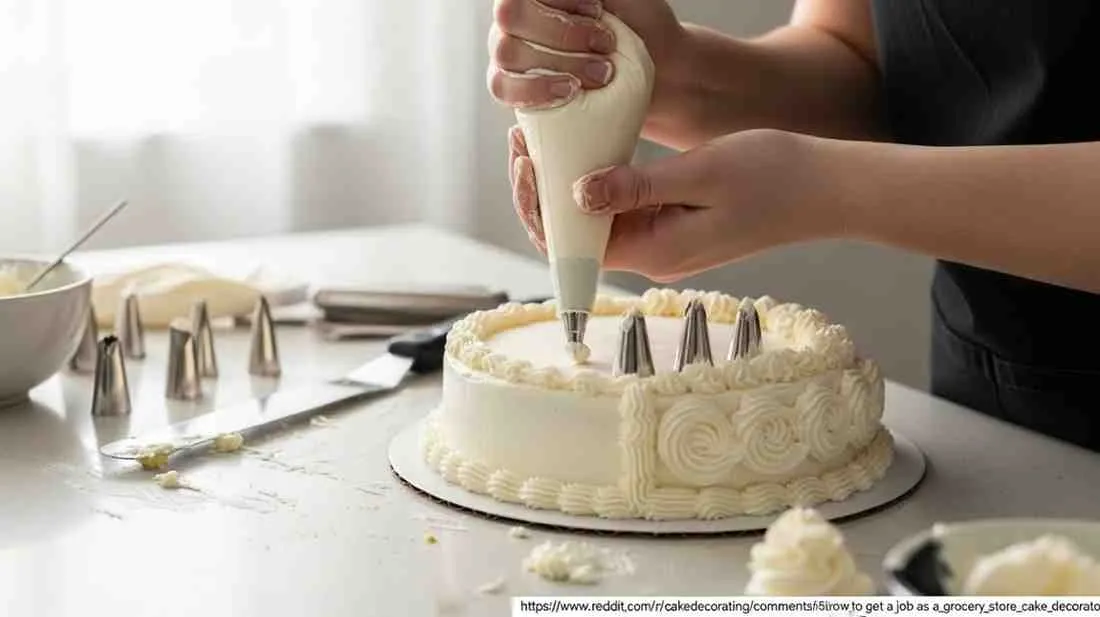
James’s Culinary School Path
James discovered his passion for cake decorating during high school culinary classes. He attended a respected culinary school’s pastry arts program, graduating with an associate degree. His externship at an upscale hotel introduced him to fine dining pastry standards. After graduation, he worked in hotel pastry departments for five years, learning from master pastry chefs.
At 28, James opened his own custom cake studio specializing in modern wedding cakes. His formal education gave him comprehensive skills, professional connections, and credibility with high-end clients. While his student loans were significant, his earning potential quickly made the investment worthwhile. His insight: “Culinary school taught me not just decorating but the business, costing, and professional standards that made starting my business much easier.”
Keisha’s Competition Career
Keisha started as a grocery store cake decorator with no formal training beyond her employer’s program. She fell in love with decorating and began practicing constantly at home. On a whim, she entered a local cake decorating competition and placed third. This sparked competitive passion—she studied competition cakes, took specialty classes, and practiced advanced techniques obsessively.
Over five years, Keisha competed regularly, winning numerous awards. Her competition success built a strong social media following and attracted custom cake clients. She transitioned from her grocery store job to full-time custom cake business, commanding premium prices based on her award-winning reputation. Her perspective: “Competition pushed my skills further than I ever would have gone otherwise. The pressure of judging forced me to perfect every detail.”
Understanding Cake Decorator Salaries and Earnings
How Much Does a Cake Decorator Earn?
Compensation for cake decorators varies significantly based on experience, location, work setting, and employment type.
Employed Decorator Salaries
According to industry data, average cake decorator salaries in the United States include:
Entry-Level (0-2 years experience):
- Hourly: 11 to 15 dollars
- Annual (full-time): 23,000 to 31,000 dollars
Mid-Level (3-5 years experience):
- Hourly: 15 to 20 dollars
- Annual: 31,000 to 42,000 dollars
Experienced (5+ years experience):
- Hourly: 18 to 25 dollars
- Annual: 37,000 to 52,000 dollars
Lead Decorators and Managers:
- Annual: 40,000 to 60,000 dollars
Geographic location significantly impacts wages, with decorators in major metropolitan areas and high cost-of-living regions earning substantially more than those in rural areas.
Self-Employed Decorator Earnings
Custom cake business owners’ earnings vary dramatically based on factors including:
- Pricing strategy and target market
- Volume of orders completed
- Business expenses and overhead
- Marketing effectiveness
- Reputation and experience
Successful full-time custom cake decorators typically earn between 40,000 and 80,000 dollars annually, with top decorators in premium markets earning six figures. However, many home-based decorators operate part-time, earning 10,000 to 30,000 dollars supplementing other income.
Benefits Considerations
Employment in established bakeries often includes benefits that increase total compensation value:
- Health insurance
- Paid time off
- Retirement contributions
- Employee discounts
- Predictable schedules and income
Self-employed decorators must provide these benefits themselves, factoring these costs into pricing and financial planning.
Advantages and Challenges of a Cake Decorating Career
Advantages
Creative Expression: Cake decorating provides daily opportunities for artistic creativity. Each cake is a unique project allowing you to bring imaginative visions to life and see tangible results of your artistry.
Skills That Last a Lifetime: The techniques you master as a cake decorator remain valuable throughout your life, useful for personal celebrations, potential side income, and creative fulfillment.
Bringing Joy to Celebrations: There’s genuine satisfaction in knowing your creations become centerpieces of life’s most meaningful moments—weddings, birthdays, anniversaries, and achievements.
Variety in Work: No two cakes are exactly alike. The constant variety in designs, themes, and challenges keeps the work engaging and prevents monotony.
Accessible Entry: Compared to many skilled trades, cake decorating has relatively low barriers to entry. You can begin learning affordably and gain employment without extensive formal education.
Flexibility: Once established, decorating skills provide various options—full-time employment, part-time work, self-employment, or transitioning between these as life circumstances change.
Steady Demand: People will always celebrate milestones and events requiring cakes. The demand for skilled decorators remains consistent even during economic fluctuations.
Challenges
Physical Demands: The work requires long periods standing, repetitive hand motions that can cause strain, lifting heavy items, and working in cold environments near refrigeration. Physical stamina and self-care are essential.
Pressure and Deadlines: Cakes for important events create significant pressure. There’s rarely room for major mistakes, and deadlines are absolute—a wedding cake must be finished for Saturday’s ceremony regardless of challenges.
Irregular Schedules: Peak demand occurs during weekends, holidays, and evenings when celebrations happen. Expect to work when others are off, especially in custom cake environments.
Starting Pay: Entry-level wages are modest. Building to comfortable income requires time, skill development, and often career advancement or self-employment.
Seasonal Fluctuations: Many bakeries experience busy seasons (spring weddings, holidays) and slow periods (January, late summer), potentially affecting hours and income stability.
Repetitive Work: Particularly in grocery stores or production bakeries, you may create similar designs repeatedly. While some find this meditative, others find it monotonous.
Client Expectations: Managing customer expectations, dealing with last-minute changes, and occasionally facing impossible requests requires patience and diplomacy.
Competitive Field: In many areas, numerous decorators compete for business. Standing out requires exceptional skills, marketing savvy, and consistent quality.
Frequently Asked Questions About Becoming a Cake Decorator
Do I Need to Go to Culinary School to Become a Cake Decorator?
No, culinary school is not required for cake decorating careers. Many successful decorators are entirely self-taught or learned through on-the-job training. However, formal education can provide advantages including comprehensive skill development, industry connections, credibility with employers, and broader career options within pastry arts. The best path depends on your goals, learning style, and resources. Entry-level positions, particularly at grocery stores, often require no formal education and provide training.
What’s the Difference Between a Cake Decorator and a Pastry Chef?
Cake decorators specialize specifically in the artistic decoration of cakes and sometimes other baked goods. Their focus is visual design, piping, fondant work, and aesthetic presentation. Pastry chefs have broader responsibilities including creating various desserts, understanding baking science, recipe development, menu planning, and often kitchen management. Pastry chefs typically require formal culinary training, while cake decorators may succeed without it. Many pastry chefs have strong decorating skills, but not all decorators have comprehensive pastry chef training.
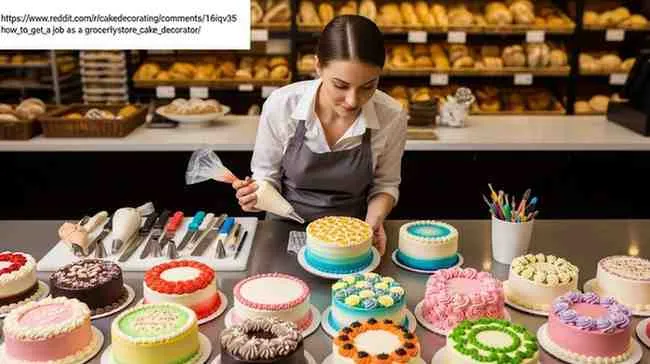
Can I Make a Living Doing Custom Cakes From Home?
Yes, many decorators successfully operate home-based custom cake businesses providing full-time income. However, this requires more than just decorating skills—you need business acumen, marketing abilities, consistent quality, and strong time management. Most successful home-based decorators spend years building reputation and clientele before achieving full-time income. Starting part-time while maintaining other income provides financial security during the building phase. Research your local cottage food laws and licensing requirements, as regulations vary significantly by location.
How Long Does It Take to Become Proficient at Cake Decorating?
Timeline varies based on natural aptitude, practice frequency, and learning resources. With consistent practice and quality instruction, most people develop basic proficiency in fundamental techniques within 3 to 6 months. Reaching intermediate skill levels typically requires 1 to 2 years of regular practice or full-time work. Advanced expertise develops over many years—most professional decorators continue improving throughout their careers. The key is consistent, deliberate practice with focus on technique improvement rather than just production.
What Are the Most Important Skills for a Cake Decorator?
While artistic ability is valuable, the most crucial skills for professional success include attention to detail, hand steadiness for precise work, time management meeting deadlines, ability to follow directions accurately, patience during detailed work, problem-solving when designs don’t go as planned, and customer service for client-facing roles. Technical skills can be learned and refined with practice, but these professional qualities determine long-term success.
Is Cake Decorating a Good Career for Someone Changing Careers?
Cake decorating can be excellent for career changers, offering several advantages: relatively accessible entry without extensive education requirements, creative work if transitioning from less creative fields, tangible results and immediate satisfaction, flexibility for work-life balance, and growing opportunities for self-employment. However, consider the physical demands, modest starting wages, and need to work when others celebrate. Many career changers successfully transition by starting part-time while maintaining current employment, reducing financial pressure during the learning phase.
What’s the Job Market Like for Cake Decorators?
The job market for cake decorators remains reasonably stable with consistent demand across various settings. Grocery stores frequently hire decorators as turnover tends to be moderate. Custom bakeries have fewer positions but often seek experienced talent. Competition varies by location—urban areas typically have more opportunities but also more competition, while rural areas may have fewer positions but less competition. Specializing in wedding cakes or developing distinctive style can differentiate you in competitive markets. The rise of cottage food laws has also created more opportunities for home-based decorators.
Conclusion: Your Path to Becoming a Cake Decorator Starts Today
Becoming a cake decorator offers a unique opportunity to combine artistic creativity with practical skills, building a career that brings beauty and joy to life’s most meaningful celebrations. Whether you dream of creating stunning wedding cakes, decorating cheerful birthday treats at your local grocery store, or eventually launching your own custom cake business, the path forward is accessible with dedication and proper preparation.
Remember these essential takeaways as you begin your cake decorating journey:
You don’t need expensive culinary school education to start—many successful decorators learned through affordable classes, online resources, and practice. What matters most is developing fundamental techniques through consistent practice and seeking opportunities to gain experience. Entry-level grocery store positions provide excellent training grounds, offering paid learning while building speed and consistency.
Master the essential cake decorator skills including piping techniques, smooth frosting application, color theory, and food safety practices. Develop professional qualities like time management, attention to detail, and customer service that distinguish successful decorators from hobbyists. Build a portfolio showcasing your abilities, even if initially featuring practice cakes rather than paid work.
Understand realistic salary expectations and career progression paths. Starting wages are modest, but experienced decorators with specialized skills command higher compensation, and self-employment offers unlimited earning potential for those with entrepreneurial skills. Geographic location, work setting, and experience level all significantly impact earning potential.
The cake decorating field welcomes career changers, offers flexibility for work-life balance, and provides the satisfaction of creating edible art that becomes centerpieces of life’s celebrations. While physical demands and pressure exist, the creative fulfillment and joy of making special occasions even more memorable make this career rewarding for those with passion and dedication.
Ready to Start Your Cake Decorating Career?
Take action this week toward your decorating goals. If you’re interested in formal education, research local community college baking programs or specialty cake decorating schools. If you prefer the self-taught route, invest in a basic decorating kit and start practicing fundamental techniques. Search for entry-level bakery positions at grocery stores in your area, even if they’re not specifically decorating roles—many decorators began as bakery clerks before advancing to decorating positions.
Connect with the cake decorating community by following professional decorators on social media, joining local cake decorating guilds, and attending classes at craft stores. Build relationships with others in the field who can provide guidance, mentorship, and eventually job leads.
Most importantly, start practicing. Purchase or bake simple cakes and experiment with basic borders, writing, and flowers. Your first attempts won’t be perfect—no professional decorator’s were—but consistent practice develops the muscle memory and technical precision that define excellent decorators.
Your journey to becoming a professional cake decorator begins with a single step. Whether that step is enrolling in a class, applying for a bakery job, or picking up a piping bag to practice, make today the day you move from dreaming about cake decorating to actively pursuing this sweet career.
Have Questions About Becoming a Cake Decorator?
Share your questions, concerns, or progress in the comments below. Are you wondering about specific training programs? Curious about working conditions at different types of bakeries? Seeking advice on transitioning from home baking to professional decorating? Let’s discuss your path to cake decorating success.
If you found this guide helpful, share it with others interested in culinary careers and bookmark it as a reference while launching your decorating career. Subscribe to our newsletter for more guides on baking careers, decorating tutorials, and industry insights.
Additional Resources:
- Wilton School of Cake Decorating and Confectionery Art: Comprehensive decorating education programs
- Retail Bakers of America (RBA): Professional organization offering certification and industry resources
- International Cake Exploration Societé (ICES): Community of cake decorators with educational resources and conventions
- Local Community Colleges: Affordable baking and pastry programs with hands-on training
- American Culinary Federation: Professional culinary organization with certification programs
Find Cake Decorator Jobs:
- Indeed.com (search “cake decorator” or “bakery decorator”)
- Local grocery store career pages
- State employment services
- Culinary job boards like Culinary Agents and Poached Jobs
- Local bakery websites for direct applications



